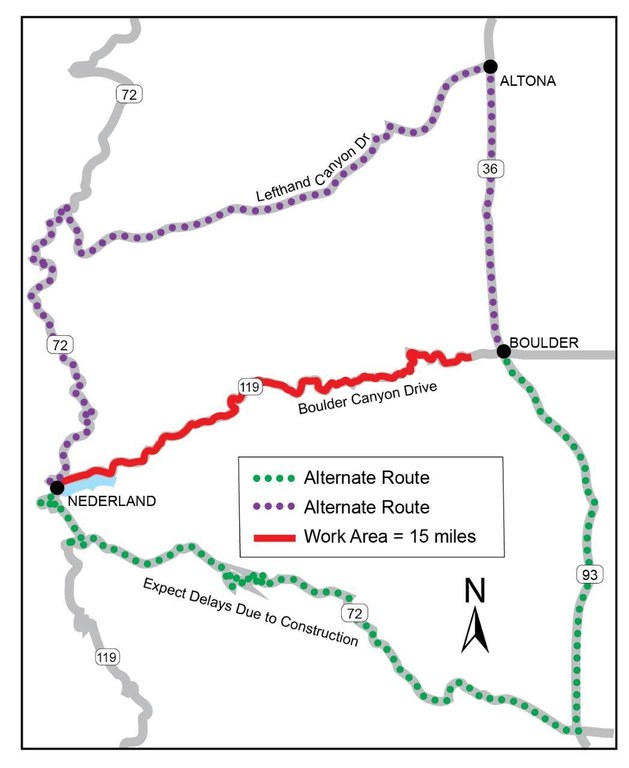Winter weather impacts rock blasting completion in Boulder Canyon
News Release
BOULDER — Due to the winter weather conditions that hit Boulder Canyon this week, final rock blasting on Colorado Highway 119 has been rescheduled for Feb. 12 and Feb. 13 from 10 a.m. to 2 p.m.
CO 119 will be closed between Mile Point 39 and MP 40, from 10 a.m. to 2 p.m. each day, while rock blasting operations occur, in order for the work to be completed as safely and efficiently as possible.
Moving quickly on these blasts will allow crews to open the road to two-way traffic in advance of a number of community activities in the area, including Frozen Dead Guy Days in mid-March in Nederland.
Snow and ice conditions made the rock face unstable for blasting operations and created an unsafe work environment for the crews and traveling public, so the work was rescheduled.
“Colorado winters are often unpredictable, as we all know, and we experienced it first-hand this week. At the end of the day, we want to make sure we’re doing our part in keeping the traveling public and our crews safe,” said Jared Fiel, communication manager for CDOT Region 4.
Rock blasting is weather-dependent, which impacts work duration and overall project completion. Please refer to the project contact information below for the most up-to-date information. Should winter weather or other unexpected conditions occur, rock blasting activities will be rescheduled.
What’s Next
Once rock blasting is completed, drivers can still expect to encounter travel delays with ongoing efforts to remove loose rocks and material from the slopes above the highway throughout February and March. Because this rock scaling work involves pushing large boulders onto the roadway below to prevent natural rockslides, traffic will be stopped in both directions for several minutes while this work is done and the roadway cleaned up. Traffic queues will then be cleared in both directions before vehicles are again stopped to continue scaling work. Drivers should plan for delays of about 20 minutes.
In addition, drivers can expect single-lane closures to resume in April for river armoring and roadway reconstruction work. These single lanes will be ongoing throughout the summer and fall.
There is also the possibility that four to five four-hour full closures will be required to complete the pedestrian path extension for Boulder County.
Construction is scheduled to be complete late 2020. However, weather could impact planned paving work. Paving operations require certain temperatures to ensure the quality of the asphalt. If weather affects the current schedule, paving will be done in spring 2021.
Drivers should continue to check the project website, email updates and hotline for the most up to date travel information. See contact info below.
Travel Impacts
Local detours remain available. From Boulder, a northern alternate route can be taken via CO 7, US 36 and CO 72. A southern alternate route is available via CO 93 and CO 72. Please note, motorists taking the southern alternate route should be aware of a current project on CO 72 in Coal Creek Canyon, between Plainview Road (mile point 12.3) and Pinecliffe (MP 24.6). Expect lane shifts and short delays at this work zone.

Anyone wanting to receive text alerts about this project and the closure can text CO119 to 21000.
Stay Informed
Travelers can obtain information about this closure and construction project by:
- Text alerts: Text CO119 to 21000 to receive updates about this closure and project text alerts.
- Road conditions and travel information: www.COtrip.org
- Sign up for project or travel alerts: bit.ly/COalerts
- See scheduled lane closures: codot.gov/travel/scheduled-
lane-closures.html - Connect with us on social media: Twitter @coloradodot and Facebook facebook.com/coloradodot
Remember: Slow for the Cone Zone
The following tips are to help you stay safe while traveling through maintenance and construction work zones.
- Do not speed in work zones. Obey the posted speed limits.
- Stay Alert! Expect the unexpected.
- Watch for workers. Drive with caution.
- Don't change lanes unnecessarily.
- Avoid using mobile devices such as phones while driving in work zones.
- Turn on headlights so that workers and other drivers can see you.
- Be especially alert at night while driving in work zones.
- Expect delays, especially during peak travel times.
- Allow ample space between you and the car in front of you.
- Anticipate lane shifts and merge when directed to do so.
- Be patient!
Whole System. Whole Safety.
In early 2019, CDOT announced its Whole System — Whole Safety initiative to heighten safety awareness. This initiative takes a systematic, statewide approach to safety combining the benefits of CDOT’s programs that address driving behaviors, our built environment and the organization's operations. The goal is to improve the safety of Colorado’s transportation network by reducing the rate and severity of crashes and improving the safety of all transportation modes. The program has one simple mission—to get everyone home safely.
About CDOT
CDOT has approximately 3,000 employees located at its Denver headquarters and in regional offices throughout Colorado, and manages more than 23,000 lane miles of highway and 3,429 bridges. CDOT also manages grant partnerships with a range of other agencies, including metropolitan planning organizations, local governments and airports. It also administers Bustang, the state-owned and operated interregional express service. Gov. Polis has charged CDOT to further build on the state’s intermodal mobility options.
